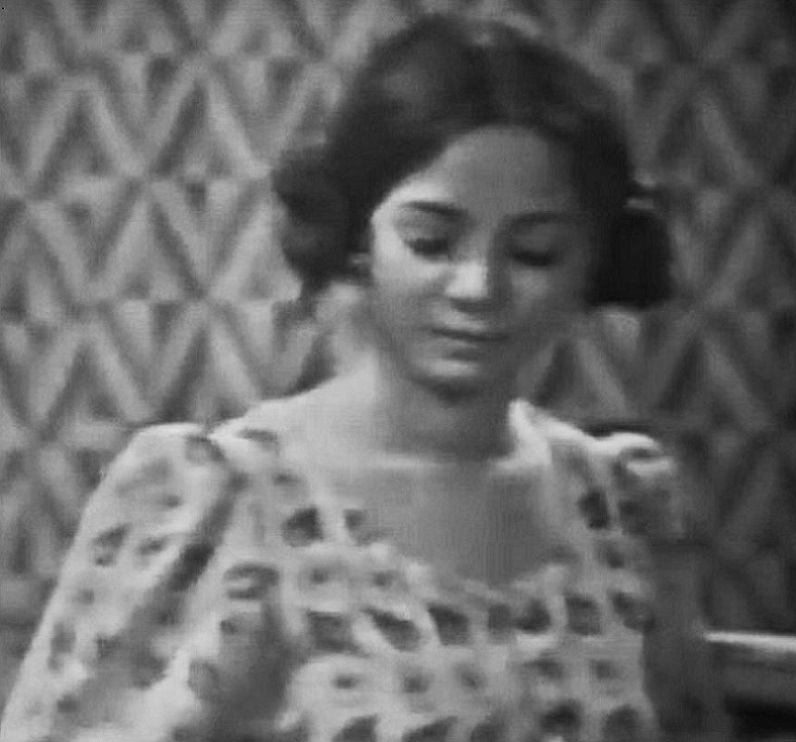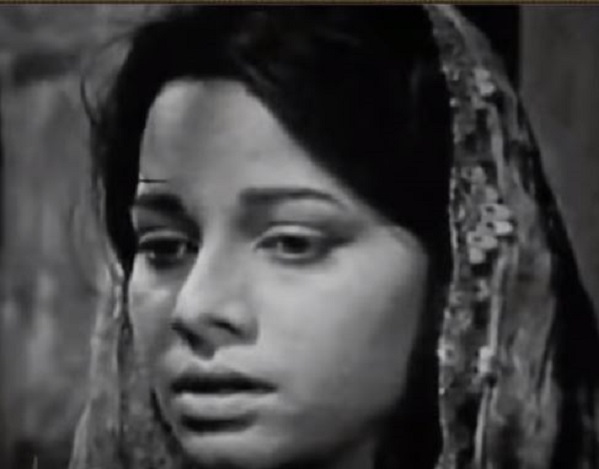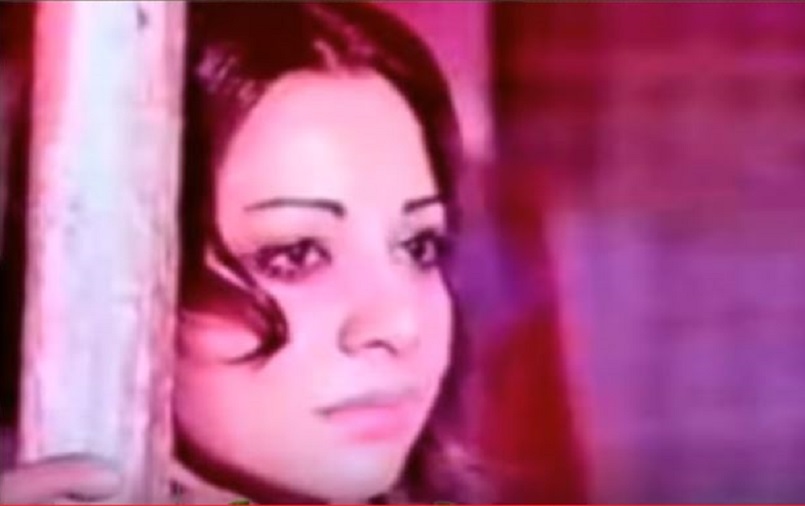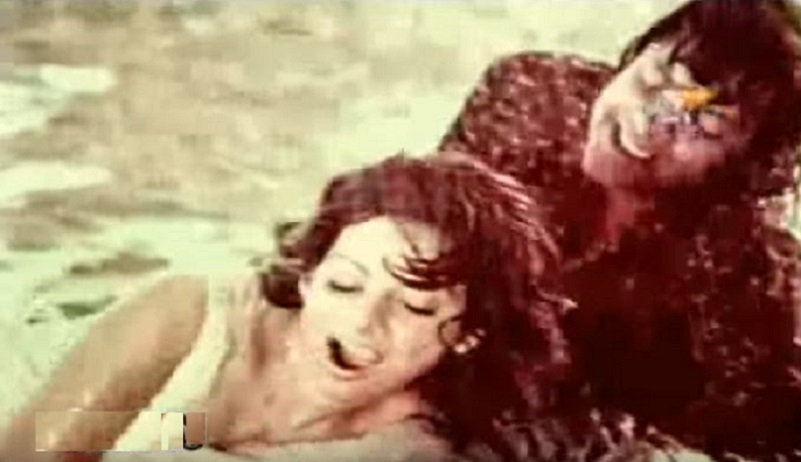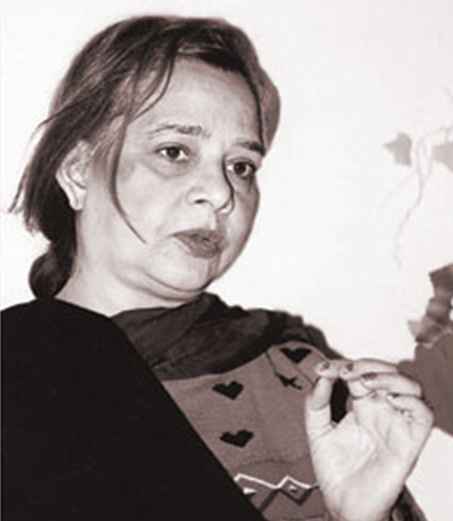Roohi Bano
This page is being compiled in India. Can some reader please help Indpaedia.com with the names of Roohi Bano’s mother and husbands. The information may please be sent as messages to the Facebook
community, Indpaedia.com. All information used will be gratefully
acknowledged in your name.
This is a collection of articles archived for the excellence of their content. |
Contents |
Personal life
Born: 10 August 1951, Karachi, Pakistan
Father: Alla Rakha
Siblings: Zakir Hussain, Taufiq Qureshi, Fazal Qureshi, Rubina Yasmin
Ustad Alla Rakha Qureshi was the best-known tabla player of his generation, and the partner-on-tabla of Pandit Ravi Shankar, the best-known sitar player of that generation (and beyond). Alla Rakha’s son is the well-known Indian actor, model and tea-endorsing (Wah Taj!) tabla player Zakir Hussain.
Ustaad Alla Rakha was born in Jammu and died in 2000 in Mumbai. He married twice. His second marriage (in the 1950s) was with a Pakistani lady from Faisalabad. He remained an Indian citizen and lived in India, while his second wife continued living in Pakistan.
Muhammad Irfan | November 9, 2018
Pakistan-born daughter of Indian tabla maestro Allah Rakha had been fallen on hard times, grappling with psychological problems and living in solitude since her only son was murdered [in 2005]
Roohi Bano, the half-sister of acclaimed musician/tabla maestro Zakir Hussain, was back in the news [in 2018] after thieves stole Rs 1 million and some valuables from her house in Gulberg area of Lahore.
A star of TV serials made in the 1970s and 1980s, Bano lost her only son Ali when he was shot dead in 2005 under mysterious circumstances at the age of 20.
Since then, she was living alone, battling medical and psychological problems. According to a report, Bano’s mental state was deteriorated as she was unable to speak clearly or coherently.
Career
Sources
Adnan Lodhi | Pakistan Television legend Roohi Bano passes away| January 25, 2019| Express Tribune
Dawn, Sunday Magazine, May 3rd, 2015
Bringing Roohi Bano back| Glorious Live
Rumana Husain Roohi Bano – bringing back the lost soul | November 2, 2003| Karachiwali
An overview
Her outstanding performances in the following made her by far the tallest TV actress of her time:
Qila Kahani,
Zard Gulab,
Hairatkada,
Darwaza,
Kiran Kahani.
Her own favourite plays were:
Jazeera
Aadhey Chehrey
Her last play was Shahid Mahmood Nadeem’s Neeley Haath (1996)
Roohi Bano, an amazing actress, joined the TV fraternity when she was doing her MSc in Psychology from the Government College, Lahore [in the late 1960s]. She is ranked as among the best acting talents that the country has produced. Television had not found a greater actress until Roohi appeared on the scene in the early years of PTV’s existence. She ruled PTV for 2 ½ decades, the 1970s, 80s n a bit of the 90s. She acted in a few films but television was where her heart was.
Roohi Bano’s first television appearance was in a quiz show in her student days. Then Farooq Zamir offered her to act in plays. She accepted the offer while continuing her studies that culminated in an MSc degree in Psychology.
She was 18, studying in FA, when her mother said to her, ‘Kuchh karna chahiye. (We need to do something). We are getting isolated. We need to take some new step.’ She took Roohi to the famous PTV writer-director Dr Anwar Sajjad. Roohi played a naagin (snake girl) in a television play (with, she would recall, the Indian song Tan doley mera man doley playing in the background.). Roohi’s dialogue delivery was very good. She then acted in Haseena Moin’s Zér, zabar, pésh
Bano acted with veteran writer Mustansar Husain Tarar in 1968 for the first time in Faraar, alongside senior actor Mohammad Qavi Khan. “I was playing a psychologist in that play, and it is sad but never did I think at the time that Roohi Bano would become a victim of so many psychological problems, or that she would become so alone in her life.” (Dawn)
Roohi Bano shot to fame in the 1970s with her remarkable performances in television drama serials. It was Kiran Kahani, penned by Hasina Moin, which turned her from a budding actress into a household name. Her portrayal of a seemingly confident girl at odds with societal norms was very well received. Owing to the success of the drama, she was inundated with offers from the film industry, because at the time graduating from television to the silver screen was thought to be the natural upward trajectory for actors. In Kiran Kahani she acted alongside seasoned performers like Manzoor Qureshi, Qazi Wajid and Begum Khursheed Mirza and she was never for a moment eclipsed by any of them.
Hairat Kada and Qila Kahani are references from her past – two Ashfaq Ahmad plays of the seventies in which she had acted.
In mid-70s Bano worked in quite a few films — Palki, Kainat, Goonj Uthi Shehnai etc. However, the ‘loudness’ that had begun to creep into Pakistani films in the late 1970s culminating in the gandasa-wielding hoopla of the 1980s was against her grain. After all, she had a master’s degree in psychology. Therefore, she saved the best of her work for the contextually rich TV long plays (tele-films in today’s parlance) of the 1980s.
In that regard, her performances in Zard Gulab, directed by Mohammad Nisar Husain, and Kala Diara, helmed by Iqbal Ansari, immediately come to mind. Kala Diara pivoted around a woman whose husband is unfaithful to her and she can’t figure out or resolve the situation. It’s a portrayal that required subtlety, and that’s exactly what Bano brought to the table.
Those who have followed the actress’s career with a keen eye suggest that it’s the play Darwazah, written by Munno Bhai, in which she outdid herself. Her depiction of a girl troubled by a life-threatening disease was as close to reality as they come. It’s a note-perfect piece of acting that certified her position as one of the finest thespians the country ever produced. Some are of the opinion that the character in Darwazah had a prophetic air about it, because what she went through in real life years later was similar to her tormented role in the drama — a classic example of life imitating art.
Mustansar Husain Tarar says that in the drama Dastan-i-Habib, Bano would cry in a scene, but then she would not be able to stop herself from crying. “Although the term was not coined back then, Bano showed magical realism through her acting with the range of emotions she expressed,” he said.
Writer Asghar Nadeem Syed says that symptoms of mental stress were apparent even then. “She would suddenly start laughing, or start crying, and wouldn’t stop,” he says. “She went into severe shock after her son’s murder. She broke down to such an extent that even if her friends wanted to help her, they could not.” (Dawn)
It wouldn’t be too wrong to say that ever since Khalida Riyasat passed away and Roohi Bano disappeared from the showbiz radar, the quality of acting in Pakistan, with reference to female performers, has left much to be desired.
She drifts off, reminiscing about an old play and its story. “My play Saraab – mirage – its story has proven true for me.” She then further elaborates her condition: “Bachpun say hairat kada may rehti hoon. Apnay khaul may nahi balkay aik qilay may rehti hoon.” She looks at me directly, now opening her eyes wide, “I live in a fortress. It is difficult for anyone to climb in.”
Roohi’s life story is perhaps as tragic as some of her roles in the PTV plays. It is as much a case of self-destruction as it is a result of a systematic lobby that was created against her, which ultimately ousted her from the position she was enjoying.
Relationships
Her contemporaries rue the fact that Roohi was 'cheated' in her time.
Rumana Husain Karachiwali writes: Having heard much about her affairs, I ask her about the men in her life. She is elusive…
“Men…” she repeats, “men either don’t understand me or I don’t understand them. I have had very few men in my life. Either they ran away from me, or I have left them…” Her marriage (and then separation) from an already twice-married media-man is well-known. She feels both she and her son have been victims of exploitation, abuse and neglect.
Next to nothing is known about the names of Roohi’s mother and husbands. Roohi obviously wanted it that way.
Roohi’s first husband, Baig sahib, approached her mother for her hand. About what he did or what his profession was, Roohi told Samaa TV, ‘That is a very big secret.’
‘He loved you a lot,’ Ms Mirza, the Samaa host asked Roohi.
‘He loved my mother,’ Roohi replied evasively.
Recognition
During her illustrious career as an actor, she earned several awards, including the President’s Pride of Performance Award, two PTV awards, Nigar Award, Graduate Award and Lux Lifetime Achievement Award.
Government support: On account of her achievements, she was given assistance from the Pakistani government.
She earned several awards, including the Pride of Performance, for her outstanding work.
Life after her stardom ended
2003: cheated by TV channel
Rumana Husain Roohi Bano – bringing back the lost soul | November 2, 2003| Karachiwali
Roohi Bano is extremely bitter about two recent events. Promised a fifty percent share in a new television channel in the pipeline – the ‘Green Channel’ – she claimed being defrauded of Rs. 200,000, apparently by the promoter. The same person also organised a programme to honour her. This was grossly mismanaged and became a fiasco.
“The Governor of Sindh, who I met recently, generously gave me Rs.200, 000. In a way he has compensated me for what I lost, but this one-time financial assistance is not the only thing I need. I would like to live and work in Karachi and requested him to arrange a place to stay.” She acknowledges the support given by Mehtab Rashdi who not only facilitated her meeting with the Governor, but also encouraged her to see her old friends in the PTV again.
2005, twin tragedies: Roohi Bano’s only son shot dead
In May 2005, Karachi Police had recovered the body of Roohi’s 80-year old mother, Zeenat Begum, from a Kulsoom Court flat in Clifton. She had serious burn injuries. [1]
Rumana Husain | Karachiwali draws our attention to the following news items from later that year:
DAWN
November 7, 2005 Monday
By Our Staff Reporter
LAHORE, Nov 6: Artiste Roohi Bano’s only son was found murdered near his residence in Gulberg III (89-B) here on Friday evening. Rafique Akhtar, the bother-in-law of Roohi Bano, told police that he visited Bano’s house on Eid day. He said his nephew Ali (24) was present at the second storey with his friends — Zahid Ashraf, Sohail Islam and Farrukh.
A police source said that Ali left the house with three of his friends besides one Hamid Bhatti who had joined them later. He suspected that one of them might have fallen out with Ali over some issue and shot him dead.
A case has been registered against the deceased’s friends. The police are raiding their hideouts.
On 01 March [2006?] Daily Times reported the following:
LAHORE: The Crime Investigation Agency (CIA) Model Town has solved the murder of Ali, son of prominent film star Roohi Bano, four months after his murder, police told Daily Times on Tuesday.
Police claimed that the culprits were cell phone snatchers and that they had confessed to having murdered Ali and to have committed several other crimes.
Lahore police arrested a hired assassin Joseph and another criminal Ramzan, who confessed Ali was killed in a mobile phone snatching incident after he had resisted. Some other accounts suggested Ali was killed over a property dispute. [2]
Roohi Bano, c.2006: a 'glum' life
Back from the shadows
By Shoaib Ahmed
Over a period of time, a lot has appeared in the newspapers and on television about Roohi Bano leading a glum life at her Gulberg residence in Lahore. The good news is that the accomplished film and TV artist was admitted to a rehabilitation centre, Fountain House, where her well-being was entrusted into the care of the staff for much-needed medical attention. Recently, Roohi shifted back home but she is not out of the woods yet. Occasional fits of rage, anguish and a feeling of loneliness still overwhelm her, especially after the tragic loss of her only son, Ali.
Although she has been issued a discharge certificate, declaring her fully recovered both mentally and physically, the painful memory of her son’s untimely death coupled with the callousness of the entertainment industry towards her plight still lurks deep within her soul, tormenting her.
One of the finest acting talents in the country, Roohi Bano was admitted to the medical facility in 2005 for the treatment of schizophrenia. She has now recovered and says that the task of bringing to justice the culprits responsible for her son’s death is central to her.
Her psychologist, Waheeda Noor, said that Roohi’s sister, Rubina Yasmin, brought her to the facility in November 2005, soon after which Ali was found murdered.
Roohi Bano is known for possessing the rare quality of conveying feelings and expressions through her eyes. As an actress, she exercised full command over her emotions and knew how best to translate them into action and convert them into pieces of unforgettable drama. She says she desperately misses her co-stars of yesteryear such as Shafi Mohammad, Talat Hussain, Uzma Gillani and the late Tahira Naqvi
After she was admitted, no one was allowed to see Roohi except Rubina for a whole year. She was in the worst kind of mental condition imaginable and would suffer from severe hallucinations. However, she made some recovery after a couple of months, but even then she would occasionally complain of ‘jealous’ relatives and co-workers.
Roohi Bano had revealed her ‘bleeding heart and soul’ to me in a somewhat recent conversation. Her first sentence was that she should have been treated at a private hospital where people would not gather around her. She said that people cared less about her well-being and were “more interested in seeing Roohi Bano, the actress of yore, undergoing treatment.” She spent time watching television, calling the TV set a “friend of her loneliness.”
Her verdict on the new wave of change that has swept over the TV circuit? “Like autumn replaces the fragrant spring, television, too, has changed. Very few plays now depicted reality. Glamour has drama in its vice-like grip.”
Recounting her days as a television actress, she said, “I put my soul into acting but I was pushed back,” she says, accusing some of her co-actors of jealousy and also condemning the politics and bribe culture that has crept into the system. “Every type of bribe was given and taken to bring down those with talent,” she said, adding, “but PTV gave me what I could never have imagined.”
Roohi’s first television appearance was in a quiz show while she was still a student. Then, Farooq Zameer offered her a chance to act in plays which she accepted while continuing her studies for a Master’s degree in psychology from GovernmentCollege, Lahore. She married twice and also acted in a few films but television was where she belonged, and it remained her first love.
Now, Roohi says she wants to act in long plays, provided she is offered a role, and also produce dramas if she has the funds. “But who will accept me as an actor now,” is the very real anguish she faces and confronts.
Given the condition she was in before treatment, her recovery has been likened to her character in one of her famous long plays, Darwaza. In the play produced by Muhammad Nisar Hussian in the 1980s, she plays a TB patient who recovers miraculously. She says she remembers the play, adding that she believes in miracles.
Roohi also believes in love which according to her “is hard to find in this materialistic world.” Among those she has loved, she remembers her mother and her son, Ali, with great fondness. With a smile she reminisces about her mother who brought the then four-year-old Roohi to Lahore from her birthplace, Bombay, in India. Being a fan of Munir Niazi, Roohi says she also has a fondness for poetry but confesses her poor memory for verse.
As an actress, she is known for possessing the rare quality of conveying feelings and expressions through her eyes. She exercised full command over her emotions and knew how best to translate them into action and convert them into pieces of unforgettable drama. She says she desperately misses her co-stars of yesteryear such as Shafi Mohammad, Talat Hussain, Uzma Gillani and the late Tahira Naqvi.
Some time ago, during a ceremony at the Fountain House, Roohi Bano was offered the job of an NGO coordinator in the Punjab government’s Social Welfare Department. The offer was extended to her by the advisor to the chief minister of Punjab. But during our last meeting at her residence, Roohi said that no official from the concerned department has contacted her with the job offer.
Television had found a great actress in Roohi Bano and her repeatedly outstanding performances in Qila Kahani, Zard Gulab, Hairatkada, Darwaza, Kiran Kahani, along with several other serials and long plays, set her head and shoulders above her contemporaries. The sensitivity with which she played her roles made her popular across the country to the effect that many of Roohi’s fans still remember her as a charming actress par excellence, who ruled the small screen for nearly two decades.
2014: Mazhar Moin’s attempt to resurrect her career
Bringing Roohi Bano back| Glorious Live
“Nowadays, no one works for the ‘art’ part of the performing arts,” says Mazhar Moin in an interview to Images on Sunday. This new wave television director is known for focusing on lower-middle class themes, sans artifice, in his plays. His critically acclaimed works include Burns road ki Nilofer, Saraye Ghat ki Farzana, Qudoosi Sahib ki Bewa, Raunaq Jahan ka Nafsiyati Gharana, Taare Ankaboot, Mithoo Aur Apa and many more.
Which is why he ventured into what others thought was a ‘risky project’ after he saw Roohi Bano as a guest in a morning show. “I’ve always wanted to work with certain senior actors,” said Moin, “As I did Taare Ankaboot with Uzma Gilani, I also wanted to work with Roohi Bano. She is an icon. We all admire her work. Because she’s so popular she gets invited onto morning shows, and channels get their high ratings, but no one actually gives her any work to do.”
Moin decided that the veteran actor still had a lot of potential. “I felt that that there is still a lot of actor in her, despite all the fuss about her being unwell,” he said.
He discussed the idea of casting Bano in a play with Fasih Bari, the writer who he has teamed up with for nearly all of his hit plays. That play turned out to be Aik Aur Aurat. Bano was to be the lead.
Whoever the director discussed the project with tried to dissuade him from doing it. He was even told that working with Bano was like throwing money away and that donating funds was a better way of helping her. “I felt that we hadn’t lost the person in Roohi Bano. We’d lost the actor,” said Moin caringly, “To make her feel good as an actor, she needs to work again. She already has her own house and my objective wasn’t to replenish her bank account. If you give a person the right kind of work and environment, there is much they can revive of their old self.”
With the script in hand and preparation for production complete, the director was ready to fly to Lahore to begin filming. The night before he was to set out, however, the producer got cold feet. “He called me in the middle of the night and said we should drop the idea: why throw money away, she can’t act anymore,” related Moin, “I told him if he had any reservations, he could opt out. Fasih had written a beautiful script, her co-actors were gung-ho about the drama, and I was ready to finance it myself.”
Once in Lahore, the director and writer met with one of their dear friends, Asma Abbass, who was also close to Bano. She introduced the veteran actor to the duo. Meanwhile, discouraging calls from ‘well-meaning’ people in the industry continued coming through. And the ‘advice’ contained in them was dutifully ignored.
The first time Moin met Bano, he ended up spending the entire day with her. Needless to say, the actor left quite an impression on the director. “She is very interesting company,” he said adding that sometimes she appears lost and experiences abrupt mood swings. “She will be talking to you and suddenly she will say that she is tired and would like to go,” he said, “With her you never know what she will say next.”
“I don’t find it weird at all because I see that kind of demeanor in other artistes too,” he said thoughtfully, “Some people are very intelligent, high-strung and ultra-sensitive. They may have gone through some disturbing times in their lives or may have been in environments that are not suited to their sensitivities. They become vulnerable and it gets noticed and easily branded as some ‘disorder’.”
“Apparently 18 years ago, she got up and left the set quite suddenly, where she was filming, and never returned to that project,” he said.
Despite having been away from the camera for over two decades, Roohi Bano gave a stellar performance in Aik Aur Aurat. She starred opposite Salman Shahid and Asma Abbass. The director described how Bano was completely involved in her character and they would often discuss her lines and overall look.
“She would watch her scenes on the monitor right after we’d take the shot,” said Moin, “We kept the make-up light and I didn’t get into the technique of it so much because if I did, Roohi Bano would’ve gotten lost in it.” He therefore kept the production as organic as possible.
On the first day of the shoot, the director found himself locked outside of Roohi Bano’s house for two hours. “I stood ringing the bell,” he related, “I didn’t know whether to raise an alarm because when a person lives alone and doesn’t answer the door for sometime … you start getting all sorts of ideas.”
The door did open eventually. As it turned out the veteran actor had forgotten all about the shoot! “She was very apologetic. She wasn’t ready and hadn’t had breakfast. I wasn’t irritated. I was just glad to see her well. I mean, c’mon, stars take that long to appear on sets!” he laughed.
After a healthy (albeit heavy) breakfast of halwa puri, filming began. “After that little jolt, she was fantastic at communicating with me,” said Moin excitedly, “She would take little notes on a sheet of paper. When she read her lines, including poetry, it sent shivers down my spine because she put so much feeling in it. It was a complicated role and only she could have done it with such honesty.”
In fact they worked so well together that the director is planning to do another play with her this year. “Working with Roohi Bano means that you need time,” he said, “And you should not be under any pressure.”
Aik Aur Aurat was aired on Hum TV recently but to a rather quiet and unceremonious reception. “It was disappointing that no hype was created,” said Moin, “I didn’t expect any accolades for myself, but Roohi Bano deserved more attention for making a comeback.
“She has been dismissed as someone who can’t function anymore. Hell, she can act!” he said forcefully.
2015: threat to her life
Dawn, Sunday Magazine, May 3rd, 2015
The recent threat to her life came [in April 2015] when Bano was attacked by her son’s friend according to an FIR filed at the Gulberg police station, after she refused to sell her Gulberg residence to him. The suspect had allegedly been pressing her for a couple of months to sell the property to him. Upon her refusal, he attacked her with a sharp object and fled. She sustained injuries on her head and ear, and according to hospital sources, her condition is now stable and she is out of danger.
Images on Sunday got in touch with her therapist, Dr Asim Amjad, who treated her with art and drama therapy at Fountain House, Lahore in 2009-2010. When asked why she had stopped visiting the care facility and if she required constant medication and treatment, Dr Amjad revealed that lack of proper care could lead to a patient’s deterioration and even death under such circumstances.
Dr Amjad has since left the care facility but has two things to say: first, a schizophrenic patient needs round-the-clock medication and care. If such a patient quits taking medication, s/he goes into full relapse. Second, Bano lacks emotional support (family, parents, children etc). Both medication and emotional support are urgently needed in order for Bano to survive.
So why did Roohi Bano stop visiting Fountain House after successful treatments? “Dr Haroon Rasheed, the then Honorary Executive Director, was a very kind-hearted person. He went out of his way to treat her through art and drama therapy and I was her therapist. She made such a remarkable recovery that we did a play with her, Roohi ki Kahani, Roohi ki Zubani at the Alhamra,” added Dr Amjad.
For a whole year, no one was allowed to see her except her sister. Initially, she was in the worst state of mind and would have hallucinations of her son visiting her. Her recovery came only after months of painstaking treatment. After Dr Haroon Rasheed passed away, the treatment sessions were discontinued as Bano could not afford to pay at the time, and have since remained discontinued.
Aik Aur Aurat was Roohi Bano’s comeback play
Roohi was also promised financial assistance by the Punjab government when she was under treatment at Fountain House. Chaudhry Pervaiz Elahi had announced a sum of Rs0.5 million. IoS asked actress-turned-politician Kanwal whether the Punjab Government is still supporting Bano to which she said that a sum of Rs25,000 per month is extended to Roohi Bano from the Artist’s Welfare Fund.
A couple of months back, a high-profile film actor (who requests anonymity) requested the President of Pakistan Mamnoon Hussain for Bano’s financial assistance and the President issued a cheque of Rs1 million for the ailing actress. The question remains: where is all the money going if it’s not being spent on her treatment and well-being?
Roohi’s sister Rubina Yasmin doesn’t want to talk to the media on this topic. IoS tried to approach her twice but she refused to comment, “I don’t want to talk to the media on any issue.” She gave a similar statement when contacted after the attack on her sister.
Also, the Pakistan National Council of the Arts once planned a documentary on Roohi Bano while Tauqeer Nasir was at the helm of affairs at the PNCA. Sadly, the project never materialized. All the more ironic since Roohi and Tauqeer have appeared in successful PTV Lahore centre productions together.
2018: disappears from Lahore
Legendary TV actress Roohi Bano disappears from Lahore | November 8, 2018 | The News
Lahore: Suffering from mental disorder, Pakistan’s finest actress Roohi Bano has disappeared from Lahore.
She is missing from Fountain House, a mental health institute and her house located in Gulberg area.
The President’s Pride of Performance Award holder Bano’s life has been a painful tragedy. Her two unsuccessful marriages and son Ali’s murder at the prime of his youth has filled her heart and soul with darkness.
Highly educated actress with a Master’s degree in Psychology was diagnosed with schizophrenia and was living at Fountain House for treatment of her health. A room for her was reserved at the Fountain House.
A year ago, Roohi’s sister Rubina took her home according to the doctors.
Her sister has been living in Bano's dilapidated house in Gulberg. But Rubina and other residents have showed their ignorance regarding the whereabouts of the former actor.
Her sister Yasmeen later denied that Roohi had disappeared and said that she was still with her family.
2019: Last days
Television legend and veteran actor Roohi Bano passed away due to kidney failure in a hospital in Istanbul, Turkey on 25 Jan 2019. She was was on the ventilator at the time of her passing.
Bano, a resident of Lahore, had also been suffering from schizophrenia since the death of her son.
She was staying at Fountain House, a facility for people who are living with serious mental illnesses.
“Bano was also suffering from diabetes and in very bad condition for the last two months,” a family member told The Express Tribune on the condition of anonymity. “She had been in the hospital for three weeks and her health was just not improving anymore.”


